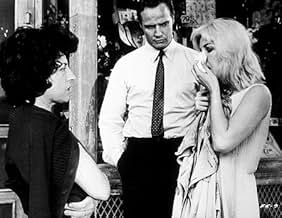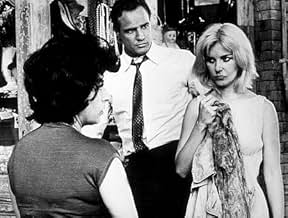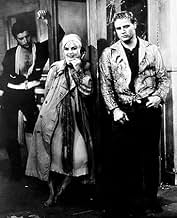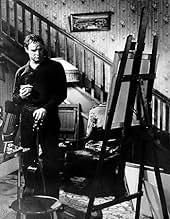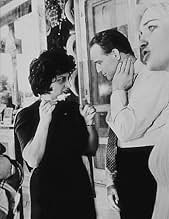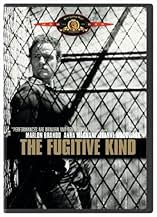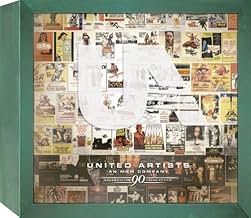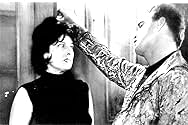IMDb RATING
7.1/10
7.9K
YOUR RATING
A guitar-playing drifter wanders into a small Mississippi town and inflames two troubled women.A guitar-playing drifter wanders into a small Mississippi town and inflames two troubled women.A guitar-playing drifter wanders into a small Mississippi town and inflames two troubled women.
- Awards
- 2 wins total
Madame Spivy
- Ruby Lightfoot
- (as Spivy)
Jeanne Barr
- Bit Part
- (uncredited)
Featured reviews
This is not a well-written film, but the acting is phenomenal. Brando and Magnani have really great chemistry and that's what carries the film. It is the acting of these two that make me want to watch this film time and time again. I didn't necessarily like Joanne Woodward in her role, it just didn't seem to fit her. It seemed like she was trying too hard or something, so I just tuned her out. But I was always tuned into Brando--its just something about him that just pulls you in--wondering what he'll do next in the scene. Anyway, The cinematography is great and adds to the moodiness of the film. Overall, the movie isn't necessarily Brando's greatest film, but it's by no means one of his worst. Unfortunately, there wasn't much to work with as far as the script, so the acting had to carry the film.
Tennessee Williams and Meade Roberts co-adapted Williams' play "Orpheus Descending" about a reluctant stud drifting through backwater town, stirring up the passions of an Italian shopkeeper who's married to a cranky invalid. Eerie and fabulously atmospheric piece gives the women in particular (Anna Magnani, Joanne Woodward, Maureen Stapleton) great roles to play. Marlon Brando, well-cast as the guitar-strumming gadabout with the bedroom eyes, doesn't seem as fully involved, and his focus tends to wander. Overall, an intriguing soap opera for mature audiences, beautifully photographed by Boris Kaufman and nimbly directed by Sidney Lumet. *** from ****
I suspect that Tennessee Williams probably agreed to change the title of his classically sounding play Orpheus Descending to The Fugitive Kind in order to insure box office. Possibly some of Marlon Brando's fans garnered from The Wild One might pay their admissions thinking they were seeing something like that. I can think of worst ways to be exposed to one of America's most respected playwrights.
This was Brando's second time doing Williams for the screen, the first time being A Streetcar Named Desire. Curiously enough this was Anna Magnani's second time doing Tennessee Williams for the screen as well, she won an Oscar in 1955 for The Rose Tattoo. So the combination of Brando and Magnani seemed a natural for the screen. I don't think The Fugitive Kind is as good as Streetcar or The Rose Tattoo, but the parts are meaty enough roles for both these honored players.
Characters seem to drift in to The Fugitive Kind from other Williams work. Brando's Val Xavier is quite like Chance Wayne in Sweet Bird of Youth, in fact in the review's title is the illusion Brando himself makes of his character. He's an early 30 something drifter with a talent for sex and music, the former probably more than the latter.
Unlike Chance, Xavier doesn't have a female keeper, but he'd like to find one. He passes up liaison with the town trollop played by a third Oscar winner in the cast, Joanne Woodward for the older and married Anna Magnani.
Magnani is trapped in a loveless marriage to a dying Victor Jory, a petty tyrant who runs the town general store. Like Big Daddy in Cat on a Hot Tin Roof, Jory is dying of cancer at a much more advanced stage of the disease than Burl Ives had. Picture Big Mama from that play hot to trot for Chance Wayne and you've got the essence of The Fugitive Kind.
Joanne Woodward has an interesting part. Part of her loose behavior is in rebellion against the time honored tradition of institutional racism that is the south that Tennessee Williams grew up in. I'm not an expert on Tennessee Williams, but of the works I've seen that are revived frequently, this is the only one where Williams directly brings up racism.
Orpheus Descending on Broadway only ran 68 performances in 1957. Two members from the Broadway cast made it to the screen, R.G. Armstrong as the sheriff repeating his role and Maureen Stapleton who had Joanne Woodward's part on stage, essays the part of the sheriff's wife who also is married to another middle aged tyrant. Considered a lesser work of Williams at first, Orpheus Descending is now revived frequently by stock theater companies everywhere. A critically acclaimed revival on Broadway in 1989 with Vanessa Redgrave and Tammy Grimes and Kevin Anderson helped bring Orpheus Descending into its proper place in the sun.
Maybe if a remake is ever done, it will even be done under its proper original title. Till then we can be well satisfied with this version.
This was Brando's second time doing Williams for the screen, the first time being A Streetcar Named Desire. Curiously enough this was Anna Magnani's second time doing Tennessee Williams for the screen as well, she won an Oscar in 1955 for The Rose Tattoo. So the combination of Brando and Magnani seemed a natural for the screen. I don't think The Fugitive Kind is as good as Streetcar or The Rose Tattoo, but the parts are meaty enough roles for both these honored players.
Characters seem to drift in to The Fugitive Kind from other Williams work. Brando's Val Xavier is quite like Chance Wayne in Sweet Bird of Youth, in fact in the review's title is the illusion Brando himself makes of his character. He's an early 30 something drifter with a talent for sex and music, the former probably more than the latter.
Unlike Chance, Xavier doesn't have a female keeper, but he'd like to find one. He passes up liaison with the town trollop played by a third Oscar winner in the cast, Joanne Woodward for the older and married Anna Magnani.
Magnani is trapped in a loveless marriage to a dying Victor Jory, a petty tyrant who runs the town general store. Like Big Daddy in Cat on a Hot Tin Roof, Jory is dying of cancer at a much more advanced stage of the disease than Burl Ives had. Picture Big Mama from that play hot to trot for Chance Wayne and you've got the essence of The Fugitive Kind.
Joanne Woodward has an interesting part. Part of her loose behavior is in rebellion against the time honored tradition of institutional racism that is the south that Tennessee Williams grew up in. I'm not an expert on Tennessee Williams, but of the works I've seen that are revived frequently, this is the only one where Williams directly brings up racism.
Orpheus Descending on Broadway only ran 68 performances in 1957. Two members from the Broadway cast made it to the screen, R.G. Armstrong as the sheriff repeating his role and Maureen Stapleton who had Joanne Woodward's part on stage, essays the part of the sheriff's wife who also is married to another middle aged tyrant. Considered a lesser work of Williams at first, Orpheus Descending is now revived frequently by stock theater companies everywhere. A critically acclaimed revival on Broadway in 1989 with Vanessa Redgrave and Tammy Grimes and Kevin Anderson helped bring Orpheus Descending into its proper place in the sun.
Maybe if a remake is ever done, it will even be done under its proper original title. Till then we can be well satisfied with this version.
The Fugitive Kind (1960)
This is one of those great movies that slips its way into that big gap between the great Hollywood Golden Age to the great New Hollywood of the late 1960s. An awful lot of films from the period between (1955-65) are weak or even downright bad, big budgets and all. The Hollywood gems in that time are usually a little gut wrenching, and many are based on plays, or push political issues (I'm thinking of "The Apartment" and "The Manchurian Candidate"). The famous directors coming to their own during time include Elia Kazan and Robert Wise, and of course Sidney Lumet, who directed this one.
This is all working class, plainspeaking, emotive material. Right from the get-go with leading man Marlon Brando doing a long take as he stands before a judge, we are filled with heart-wrenching stuff, people who want to be something and don't know how, or people with big hearts that are broken or dirty. The cast, beyond Brando, is terrific: Joanne Woodward as a young floozy with a sharp sense of independence, Maureen Stapleton as a simple and faith filled wife of the sheriff, and Anna Magnani, intense and troubled but superior in her own out of place way.
There are powerful displays of white narrow-mindedness (call it bigotry, but it is largely aimed at just anyone they don't like) that don't quite fall into clichés, there is love that shouldn't be and that never is, there is old world morality and inbred local gossipy immorality. Things are bound for collision even by twenty minutes in, and there are innuendoes and hidden histories waiting to blossom.
Lumet has a knack for the serious, with his 1957 breakthrough film "12 Angry Men" a template for his career. As lively and even crazy as this movie is, it's also probing deeply into human woe and maladjustment (often deliberate). The core of the writing belongs to Tennessee Williams, who of course is all about inner troubles and outward misunderstood or mistaken actions. There is nothing superficial here, not in the acting, the filming, or the scenes (set in the South but filmed near Saratoga Springs, New York). And if the wet, dark nights scenes and interiors with people quarreling and fighting aren't enough to suck you in, the story, about wanting to live, nothing more, is beautiful and important. All four of the main characters are deeply good people, and all flawed in small but debilitating ways.
Which should sound familiar. As over the top as it sometimes seems, you'll identify with the position some of the people end up in. Brando is temperamental but patient and with a profound sense of justice. Woodward is a free spirit misunderstood (and punished) by the uptight and hypocritical society around her. The themes are frank for 1960, including an implication of a male so manly and irresistible the women want him (and get him) even when it's completely wrong. And when it's right. The sexuality, partly pumped up by the writing of the openly gay playwright (Williams), is all over Brando's face and in his scenes. And this is his movie.
High high drama, but from within. And explosive. Don't miss it.
This is one of those great movies that slips its way into that big gap between the great Hollywood Golden Age to the great New Hollywood of the late 1960s. An awful lot of films from the period between (1955-65) are weak or even downright bad, big budgets and all. The Hollywood gems in that time are usually a little gut wrenching, and many are based on plays, or push political issues (I'm thinking of "The Apartment" and "The Manchurian Candidate"). The famous directors coming to their own during time include Elia Kazan and Robert Wise, and of course Sidney Lumet, who directed this one.
This is all working class, plainspeaking, emotive material. Right from the get-go with leading man Marlon Brando doing a long take as he stands before a judge, we are filled with heart-wrenching stuff, people who want to be something and don't know how, or people with big hearts that are broken or dirty. The cast, beyond Brando, is terrific: Joanne Woodward as a young floozy with a sharp sense of independence, Maureen Stapleton as a simple and faith filled wife of the sheriff, and Anna Magnani, intense and troubled but superior in her own out of place way.
There are powerful displays of white narrow-mindedness (call it bigotry, but it is largely aimed at just anyone they don't like) that don't quite fall into clichés, there is love that shouldn't be and that never is, there is old world morality and inbred local gossipy immorality. Things are bound for collision even by twenty minutes in, and there are innuendoes and hidden histories waiting to blossom.
Lumet has a knack for the serious, with his 1957 breakthrough film "12 Angry Men" a template for his career. As lively and even crazy as this movie is, it's also probing deeply into human woe and maladjustment (often deliberate). The core of the writing belongs to Tennessee Williams, who of course is all about inner troubles and outward misunderstood or mistaken actions. There is nothing superficial here, not in the acting, the filming, or the scenes (set in the South but filmed near Saratoga Springs, New York). And if the wet, dark nights scenes and interiors with people quarreling and fighting aren't enough to suck you in, the story, about wanting to live, nothing more, is beautiful and important. All four of the main characters are deeply good people, and all flawed in small but debilitating ways.
Which should sound familiar. As over the top as it sometimes seems, you'll identify with the position some of the people end up in. Brando is temperamental but patient and with a profound sense of justice. Woodward is a free spirit misunderstood (and punished) by the uptight and hypocritical society around her. The themes are frank for 1960, including an implication of a male so manly and irresistible the women want him (and get him) even when it's completely wrong. And when it's right. The sexuality, partly pumped up by the writing of the openly gay playwright (Williams), is all over Brando's face and in his scenes. And this is his movie.
High high drama, but from within. And explosive. Don't miss it.
"Orpheus Descending" may be one of Tennessee Williams' lesser plays but this screen version, under the more commercial title "The Fugitive Kind", is a fairly juicy entertainment. thanks for the most part to the playing of Marlon Brando, Anna Magnani and Joanne Woodward. They are superb and lift the material, which is far from first-rate, to an altogether higher plain. The director was Sidney Lumet and while it may not be the best thing he's ever done, he certainly ensures we are never bored.
Williams himself adapted his play along with Meade Roberts and he signposts all the big moments well in advance. Once you hear Magnani's Lady Torrence tell of how vigilantes burned down her father's orchard with him in it, you know how things will turn out - badly! The superb cinematography, in widescreen and in black and white, is by the great Boris Kaufman and the nice, bluesy score is by Kenyon Hopkins.
Williams himself adapted his play along with Meade Roberts and he signposts all the big moments well in advance. Once you hear Magnani's Lady Torrence tell of how vigilantes burned down her father's orchard with him in it, you know how things will turn out - badly! The superb cinematography, in widescreen and in black and white, is by the great Boris Kaufman and the nice, bluesy score is by Kenyon Hopkins.
Did you know
- TriviaMarlon Brando described Anna Magnani as being equally fiery and passionate off screen. He claimed she made a pass at him in a hotel before filming began.
- GoofsAt the cemetery, Xavier returns to the car and turns on its headlights. A much brighter studio light comes on a beat too late to further illuminate the right side of the frame.
- Quotes
Lady Torrance: Tell me some more about your self-control.
Valentine Xavier: Well, they say that a woman can burn a man down, you know? But I can burn a woman down. I'm saying that I could. I'm not saying I would.
Lady Torrance: What's the matter? Have they tired you out?
Valentine Xavier: No, I'm not tired.
- How long is The Fugitive Kind?Powered by Alexa
Details
- Release date
- Country of origin
- Language
- Also known as
- El hombre de la piel de víbora
- Filming locations
- Production company
- See more company credits at IMDbPro
Box office
- Budget
- $2,000,000 (estimated)
- Runtime
- 1h 59m(119 min)
- Color
- Aspect ratio
- 1.66 : 1
Contribute to this page
Suggest an edit or add missing content


